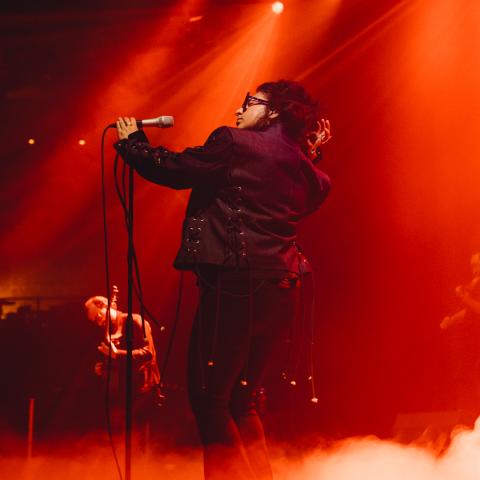Behind the Board for Grammy Winners
Beck’s Friend Forever
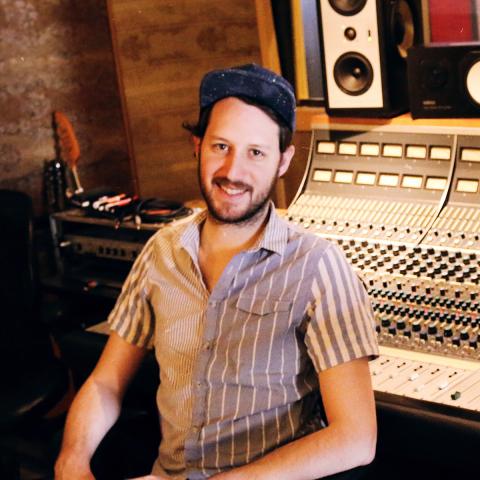
“Beck is a perfectionist, so there were lots of revisions and permutations on every song. It was amazing to go down that road with him.” —David Greenbaum ’05
This year’s Grammy Awards represented a high-water mark in the unfolding career of Music Production and Engineering (MP&E) graduate David Greenbaum ’05, who did engineering work on Beck’s album Morning Phase. The record won statues for Album of the Year; Best Rock Album; and Best Engineered Album, Non-Classical. But Greenbaum wasn’t at the broadcast to get the word. He was streaming it during the middle of the night in London via a tenuous Internet connection.
Greenbaum began working full time as an engineer for Beck at the artist’s home studio in Malibu, California, during the early stages of the Morning Phase production. Beck and Greenbaum forged a connection when the two were neighbors. “I was living in Malibu about a two-minute walk from Beck’s house,” Greenbaum recalls. “I reached out to his manager and told him that if they ever needed an engineer, I was in the neighborhood.” They took him up on his offer. Now, aside from when Beck is on tour, Greenbaum spends many long days in the studio with the artist.
Several engineers worked on Morning Phase in studios in Los Angeles, Nashville, Paris, and London. Greenbaum traveled for some of the sessions, but worked primarily with Beck in Malibu. “Some of the basic tracks were recorded by Darrell Thorp at Ocean Way [Recording in Hollywood],” Greenbaum says. “I worked more on overdubs, editing, and sound design for the ear candy on the album.”
The editing was intense. Beck had sorted through his hard drive archives containing promising song fragments and band jams to gather the material he wanted for the album. There were sessions from the time Beck spent in Nashville with local players working out ideas. Some of those tracks ended up on the album. Greenbaum relates that Beck later rerecorded some of those tunes with his own band in LA and then blended tracks from both locations. He also sent in vocal tracks recorded in Paris. It was Greenbaum’s task to fit all the pieces together in Pro Tools. “Getting everything to coalesce in a musical way was part of the challenge in the editing,” Greenbaum says. “Beck is a perfectionist, so there were lots of revisions and permutations on every song. It was amazing to go down that road with him.”
The project had grown to mind-boggling complexity when Greenbaum finished his part. “I took a break to work with my own band while he mixed it,” he says. “When I came back, Beck was mastering it and I couldn’t believe how it all had come together. It had felt massive, almost chaotic before [mix engineer] Tom Elmhirst sorted through and stripped things down. In the end, the album sounded very controlled and kind of understated. It was so different from what I thought it would be. I was floored when Beck played me the revisions he was doing with [mastering engineer] Bob Ludwig. It was amazing. I told him I thought it sounded even better than Sea Change, which many think is his best album. Morning Phase is mind-blowing and gorgeous.”
Aside from engineering work, Greenbaum is also pursuing his own writing and performing career with singer/songwriter Sophie Stern ’07, whom he met at Berklee. “When our project, Sophie and the Bom Boms started getting a lot of attention, I realized that being a [performing] musician was still in me,” he says. “It’s great playing my own music as a multi-instrumentalist on keyboard, guitar, drum pad, and a laptop.” The duo released their first EP with Columbia Records, and will release new material independently. They have signed with London-based Turn First Artists management and Creative Artists Agency (CAA) for touring.
Greenbaum has already started working on Beck’s next album. He’s confident that he can balance recording with Beck and his own band’s schedule. “It’s the best possible problem to have—all these opportunities,” he says. “I’m trying to do as much as I possibly can, and it’s working out. Beck goes off on tour for a few months and then we get back together to work on new material. I hope to work with him for a long time. Aside from his albums, we’ve worked on many other cool projects. He works with the best people, has the best gear, and is a wonderful person. It’s hard to imagine an engineering gig that would have more allure than that.”
Chick’s Mix
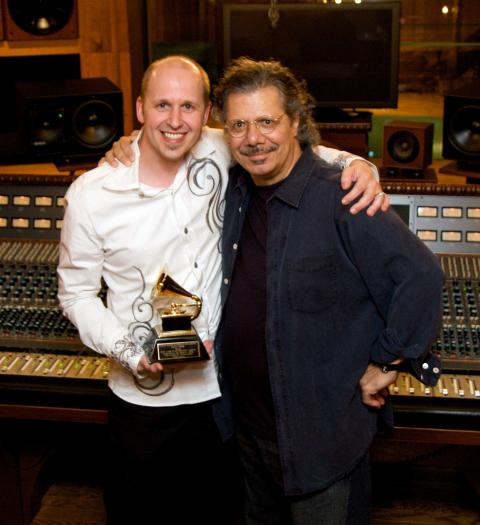
Brian Vibberts '91 (left) and Chick Corea "I go for the mood of the interaction between players, I do mix moves to make sure that's all heard." -Brian Vibberts '91
Vibberts’s latest Grammy is for mixing Corea’s Trilogy, a live three-CD set featuring the pianist with bassist Christian McBride and drummer Brain Blade, and a cameo vocal appearance by Corea’s wife Gayle Moran Corea. The repertoire features chestnuts such as “Spain” and “Armando’s Rhumba” from Corea’s catalog, a handful of standards and a jazz take on a Scriabin piano sonata. Vibberts has been doing mixes for Corea for the past eight years.
“In 2007, I was working with an English group called the Jive Aces, a modern swing band,” Vibberts recalls. “I was recording and mixing their album and Chick was a guest soloist. I didn’t meet him during the session, but after I mixed it, he asked who the mixer was. Later I got called to mix one of his albums, a boxed set of five CDs, called Five Trios. Each CD featured a different trio in live and studio recordings. I mixed the New Crystal Silence album following that.”
The fall after he earned his MP&E degree at Berklee, Vibberts started his career in New York as a general assistant engineer at Right Track Studio. In 1993 he moved to the Hit Factory where he further polished his engineering and mixing skills with A-list artists such as Paul Simon, Dave Matthews, Céline Dion, and with producer Bruce Swedien on Michael Jackson’s HIStory album. By 1995, he was a staff engineer at Sony Music Studios where he worked with Sting, Herbie Hancock, Mariah Carey, producer Phil Ramone, and many other top artists and producers.
In 2000, he switched coasts. “I thought I’d see what was going on in LA,” he says. “In addition to music, there is film and TV business here too. I started getting a little work from people I’d known in New York and after about six months I was on staff at Ocean Way Recording.” By 2004, a growing number of artists recording at Ocean Way were requesting Vibberts as the primary engineer for their sessions, so he decided to become a freelancer. Since then, he has worked steadily with a roster of major label and independent artists in many musical styles. Projects he’s worked on in his 24-year career have netted more than 250 Grammy nominations and 65 Grammy wins.
Vibberts has branched out to start Spotlight 87 Entertainment, a production company, with Alex Horton, whom he met in Berklee’s MP&E program in 1987. “After working together on a number of projects, Alex and I decided to join our networks together and form a company in 2009,” Vibberts says. “About a year and a half ago, Adam Wake ’92 approached Alex and me with an artist from London, Kaylah Griffiths. She was someone we all wanted to get behind, so the three of us formed the indie label Metro 3 Entertainment. These are just a few of the Berklee connections that keep popping up in my career.” An upcoming project on Vibberts’s calendar is a recording for Antelope Audio that will feature Lalah Hathaway ’90, another friend from his Berklee days.
When asked about contributing factors in his success mixing for Corea, Vibberts is specific. “I go for the mood of the interaction between the players,” he says. “I do mix moves to make sure that’s all heard. These players are equals: the piano is not really the primary instrument.”
Vibberts has advice for aspiring engineers. “An assistant today needs to understand the technical work but also understand what’s going on in the room. If there is a technical problem, you should already be thinking about what needs to be done. You should also be aware if the artist needs water or if it’s time to order lunch for the musicians. Having that kind of awareness will get you noticed by the artist, producer, and engineer. You don’t want to be the assistant who is texting and playing games on his phone while the session is running. You should always be trying to learn something new.”
Serious Fun
Brian Warwick ’03 recently got to toss a bone to his older brother. The two have been serious “Weird Al” Yankovic fans since their parents bought them the Dare to Be Stupid album. Many years later, Warwick became the primary vocal and overdub engineer on many of Yankovic’s albums. So when the musical jester mentioned to Warwick that he was looking for extras for the video of “Sports Song” as they worked on his Grammy-winning album Mandatory Fun, Warwick volunteered himself and his brother to appear in band uniforms playing parade drums in the shoot. And the mandated fun brought a smile to the faces of all involved.
After earning his MP&E degree in 2003, Warwick headed to Los Angeles and started passing his résumé around to various studios. Rose Mann-Cherney, then an executive at the Record Plant, hired him as a runner. It was not glorious work at first, but MP&E professor Ted Paduck had told his students what to expect at the outset of their careers. “He said that when you’re an intern, a runner, or an assistant engineer, just think of yourself as a glorified waiter,” Warwick recalls. “So I’ve always taken client needs very seriously—even when I am the main engineer.”
The affable Warwick’s technical finesse behind the controls paired with his enthusiasm for basic tasks like meticulously setting up headphones and mics for the main engineer and tending to the needs of the musicians and artists during sessions enabled him to quickly progress from runner to assistant engineer at the Record Plant and later at Westlake Recording Studios. He’s worked elbow to elbow with top producers such as Glenn Ballard, Randy Jackson, Ron Fair, and Lester Mendez, and with such diverse artists as Ludacris, Fantasia, Michael Bublé, Lissie, Annie Lennox, and others. He has also worked on 14 platinum and gold records, and a dozen Grammy nominated records as well as music for television shows. He finally earned his own statue last February for his work on Weird Al’s Mandatory Fun when it was named best comedy album.
The two met when Yankovic booked time at Westlake to mix his Straight Outta Lynwood album in 2006 and Warwick was assigned as the assistant engineer. “We all got along really well,” Warwick says, “and that ultimately led to Al becoming one of my main clients.” After years as a staff engineer, Warwick had enough clients in his stable to leave Westlake and become a freelancer. He continued working with Yankovic as well as with Michael Bublé (and his music director Alan Chang), and Steve Kaplan, the score mixer for TV composer Bear McCrary (Walking Dead, Marvel’s Agents of S.H.I.E.L.D.).
“Tracking is my main thing,” says Warwick, “and about 75 percent of my sessions are vocal sessions. I’ve developed a great rapport working with Al on his vocals. Once he gets something going, he generally doesn’t want to change, but for the Mandatory Fun record, he changed things up. For previous albums Like Alpocolypse, he was booking time at Westlake and renting expensive mics, preamps, and EQs. He decided this time to go to a smaller studio and went to Dave Way’s Waystation.”
Way and Warwick worked separately on Yankovic’s record. Way did the tracking with Yankovic’s band and Warwick engineered all the vocals, electronic tracks, and overdubs. “I also engineered all of the track ‘Now That’s What I call Polka,’” Warwick says. “Dave mixed the whole album, and the mixes came out great.”
As a member of the Recording Academy, Warwick can always get tickets to the Grammy ceremonies, but hadn’t gone in previous years. It was Warwick’s wife, Ashley (Caldwell) Warwick ’04, who convinced him that they should go this time. “She has been my biggest supporter throughout my career,” Warwick says. “So even though it was expensive to go, I’m glad she wanted to. It was a thrill to be there to see Al get the award.”
Trying Dave’s Way
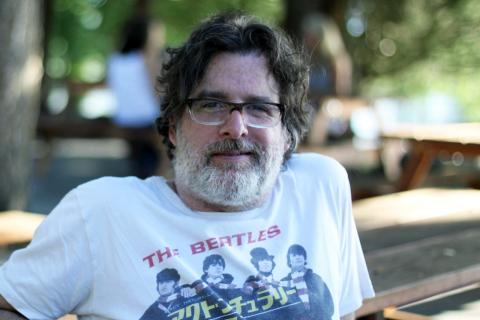
"Everyone knows him as a comedian, but I see him as a serious guy." -Dave Way '91 on working with "Weird Al" Yankovic
“Of course Al is very clever and funny, but he’s also a brilliant musician,” Way notes. “He’s very knowledgeable and comes in really prepared with charts and MIDI tempo maps. He knows how he wants everything to go, it’s very impressive. Everyone knows him as a comedian, but I see him as a serious guy.”
This latest Grammy ceremony wasn’t the first for Way. He won in 2006 with Ziggy Marley in the Best Reggae Album category, and earned two Latin Grammys the same year for his work on Shakira’s Fijación Oral Vol. 1 (Album of the Year and Best Engineered Album). Notably, Way was also nominated this year in the Best Engineered Album, Non Classical category for Tom Dybdahl’s The Way I’m Livin’ album.
Way headed straight to New York after graduating with his MP&E degree in 1987. He was hired as a runner at the Hit Factory and later went to Soundworks where he worked with producers Teddy Riley and Shep Pettibone and artists Brian Wilson, Duran Duran, and Madonna among others. In 1990 when Riley went to LA to work for several months on Michael Jackson’s Dangerous album, he brought Way as his engineer. It was a one-way ticket.
“Afterwards, Teddy decided to build a studio in Virginia Beach, and I wanted to stay in LA,” Way recalls. “A lot of people here wanted to hire me. There was some kind of allure because I was from New York. So I stayed, and now it’s been 25 years.”
Way’s résumé lists high-profile recordings in many styles from hip-hop (Kool Moe Dee) to dance tracks (Taylor Dayne) to mellow R&B (Babyface) to straight-up pop (the Spice Girls) to rock (the Foo Fighters). For five years he owned the Pass Studios, a commercial facility formerly known as Larrabee East. In 2002, he opened the Waystation Studio, a smaller private facility at his home where he has worked ever since.
“The only thing I miss about working in the big studios is running into other engineers, producers, and musicians in the hallways,” Way says. “But I prefer making records here. There is something about the casual feeling that makes the creative energy feel really high here.”
Way is frequently hired to track and mix as he did for Yankovic’s Mandatory Fun. “I love both,” he says. “Tracking is great because you’re creating something that wasn’t there before, being in the moment and capturing it. Mixing is a process where you try things, step back, and then dig in again. It’s more of a lonely gig because you’re mainly working alone—even if the client is in LA. If I’m mixing an album, I’ll get four or five songs to where I think they sound good. I send them off, get feedback and then make tweaks. When everything is pretty much there, the client may come over and we finish it up. We used to have to do each song like that. The way I work now I can juggle five or six projects at once.” When I visited Way, he was finishing up albums for Jakob Dylan and Ben Folds.
After 20 years working with a large mixing board, Way went to a smaller digital audio workstation. “I got rid of my big SSL console a few years ago,” he says. “You have to adapt musically and on the technical side. I much prefer working as I do now. I can mix as I’m recording and come back and tweak a mix done months ago. You couldn’t do that 10 years ago.”
“I swear I’m working harder than ever before. I don’t get paid as much as I used to in the ’90s; budgets are down. But I work as much as I can because I love doing all of these different projects and being around people who love music. Doing indie projects means the label is not in your hair. It makes the studio a much more creative place to work if you’re not trying to second-guess what a record label wants and how they are going to sell it. I am more satisfied making records now than I was with the majority of things I did in the 90s and early 2000s.”
Bypassing LA and New York
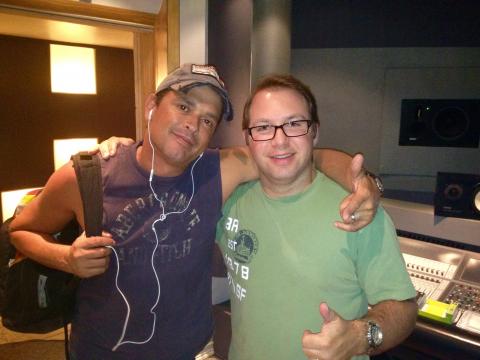
Carlos Vives (left) and Shafik Palis '01 "It's been very exciting to work with him. I grew up with his music." -Shafik Palis '01
Palis grew up in Barranquilla, Colombia, on the country’s northern coast. Notably, his hometown is only about an hour’s drive from Santa Marta, where Vives grew up. Vives’s career as a singer/songwriter and actor has been going strong since 1991. Pails was a big fan of his music, but the two never met face-to-face until they began working in the studio in Miami years later. “It’s been very exciting to work with him,” Palis says. “I grew up with his music.”
At a young age Palis was drawn to music, and during his early teens he became very interested in recording. “I started recording local bands at my home on a four-track Portastudio cassette recorder,” he recalls. “My interest continued to develop from there.” Palis came to Berklee in 1997 where he majored in MP&E and graduated in 2001.
Unlike other MP&E grads, New York and Los Angeles weren’t a lure for Palis. “I went directly to Miami after graduating,” he says. “But not for the Latin music scene; it was because I knew the city. My family used to go to Miami for vacations. So I knew people there and I wanted to be closer to Colombia.”
Palis was soon working as a freelance engineer at several Miami studios and ultimately began recording such Latin stars as Grupo Niche, Kany García, Gato, Jorge Celedón, and Omar Alfanno. “I began working with Omar in his private studio,” Palis says, “and through him I ended up working with Andrés Castro.” That was a pivotal connection as Castro produces Carlos Vives and plays guitar in his band.
In recent years, Palis has worked on many different projects that Castro has produced for other artists, and every time he brings Vives into the studio, Palis is on the session. “When you’re working in the studio with Carlos, the vibe is always very happy. He’s a big Latin music star, but a very humble and down-to-earth guy. Working with him and his band is like having a piece of home here.”
When asked if he felt impressed while recording Más + Corazón Profundo the album might win a Grammy, Palis says, “You’re not thinking about that as you work in the studio, but you can’t help having it in the back of your mind. Every time Carlos puts an album out, he’s always a contender for a Grammy.”
When Palis is not working on albums, he works in audio postproduction for television. He’s done sound design and composing as well as recording and mixing for the Telemundo and Nickelodeon networks in both the Spanish and English markets. The potential for that work is a result of a course Palis took ramdomly at Berklee. “When I was a student, I just wanted to be in the studio recording and producing. But I needed an elective, so I took a course on audio for visual media. I wasn’t interested in the class; I just needed the credits. Now I am working in that area and that class really helped with what I do in audio post, even though this work was never in my plan.” Aware of Palis’s skills with visual media, Vives asked him to score the video he’d created as the concert opener for his last world tour. Palis created and mixed the soundtrack accompanying images of the mountains and rivers of Vives’s hometown of Santa Marta.
Palis relates that after he won the Grammy, his niece said, “It must have been your dream to win a Grammy.” He answered, “No, that wasn’t my dream. My dream is to wake up everyday and work at what I love doing and be able to support my family. I’m living my dream and feel very fortunate.”
Awards in the Garage
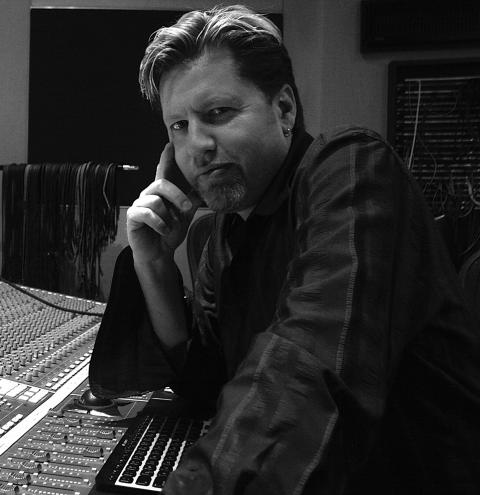
"A French Babyface fan compiled and sent me the discography of everything I've worked on with Kenny. I never realized how many successful things we've done." -Paul Boutin '94 on working with Kenneth “Babyface” Edmonds
After Toni Braxton's and Babyface’s Love, Marriage, & Divorce album won a Grammy in the Best R&B Album of the Year category, Paul Boutin ’94, who engineered and mixed the album, was asked by his wife where he would put the Grammy statue. He told her that it would probably end up with the 23 gold, 15 platinum, and 16 multiplatinum records he’s collected over the past 20 years working with singer/songwriter and producer Kenneth “Babyface” Edmonds. “I don’t display my awards, they are all in my garage,” Boutin says. “They will be fun to look at later.”
It’s not that Boutin is unappreciative; his philosophy is to remain focused on today rather than yesterday or tomorrow. Boutin, the son of a French father and an American mother says, “A French Babyface fan compiled and sent me the discography of everything I’ve worked on with Kenny. I never realized how many successful things we’ve done.” The long list includes titles by Céline Dion, Whitney Houston, Michael Jackson, Alicia Keyes, Jamie Foxx, Ariana Grande, and more.
Boutin worked with Braxton and Edmonds on the Grammy-winning album over the course of eight months, tracking the entire thing. He ended up feeling like it was his baby. But despite completing many projects with Edmonds, Boutin still had to make a case to be the one to mix it. “Generally, the record label chooses the mixer,” Boutin says. “When the mixes started coming back, I was disappointed, I knew they could be better. So without telling him which one he was listening to, I played Kenny the label’s mix and mine back to back. Each time he picked mine as the one that sounded better.” After three out of three times, Edmonds asked Boutin to mix the album.
Boutin was born and raised in France, and to please his father, he undertook rigorous biological engineering studies at a top French prep school. But knowing his heart was in music, his mother urged him to attend Berklee for college. “I came to Berklee hoping to be a guitarist but got scared when I heard how well the other guitarists were playing,” he says. After taking some songwriting courses he decided to major in MP&E. “I fell in love with it,” he recalls. “It had the mathematics side that I grew up with and the music side.”
A few courses shy of graduating in 1994, he decided to join a French friend who had moved to Los Angeles, and sent out résumés to various studios. He got offers to work at two small studios as an assistant engineer before he’d even arrived. “The Berklee name has helped me a lot over the years. I didn’t realize how much it would help.” Boutin kept sending out résumés to the major studios and was finally hired by Rose Mann-Cherney to be a runner at the famed Record Plant. He observed top engineers working on major projects in between runs for lattés.
Then, in a fateful scenario, an assistant engineer couldn’t make an important session, and Boutin was asked to step in. He worked on the soundtrack to Waiting to Exhale with Kenneth “Babyface” Edmonds. The two worked on other projects at the Record Plant over the course of eight months while Edmonds built his own studio, Brandon’s Way, nearby. Upon its completion, Brad Gilderman, Edmonds’s engineer, hired Boutin as his assistant. Within a year, Boutin was the head engineer for Brandon’s Way.
Through the years, Boutin and Edmonds have worked with an astonishing array of artists, including Aretha Franklin, Paul McCartney, Rascal Flatts, the Rolling Stones, Barbra Streisand. They are currently working with Colbie Caillat, among others. Working with Edmonds is the best of all situations for Boutin.
“I have a very French attitude,” Boutin says. “Family is more important to me than money. I am not in this to make money, I want to be happy, and be with my family.” Edmonds is also a family man, and mostly schedules shifts in the studio of eight or nine hours beginning at noon, and doesn’t schedule weekends. I know I’m really lucky,” Boutin says. “My other engineer friends are going into the studio at 6:00 P.M. and getting out 12 hours later. I couldn’t do that.”
About the future, Boutin says, “I never look more than a year ahead. I don’t really believe in dreams; they can get ahead of you and then you are working based on the dream. I’m more of a practical guy and base things on what I’m doing now. I have a great situation, but understand that it could end if Kenny decided to stop doing music. But I’m not going to worry about anything like that in advance.”


